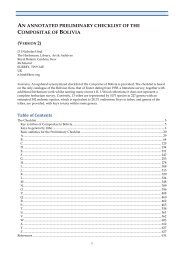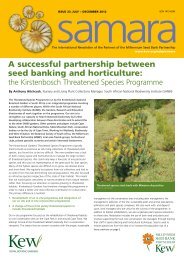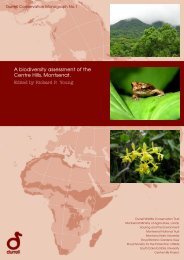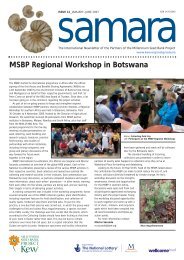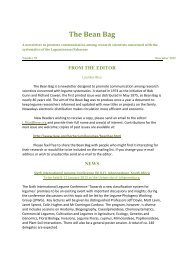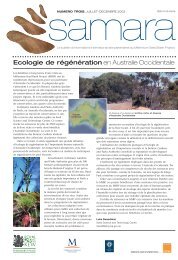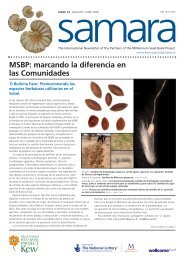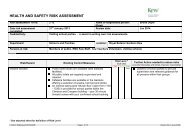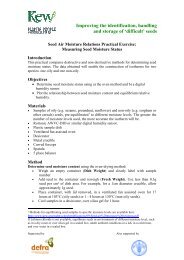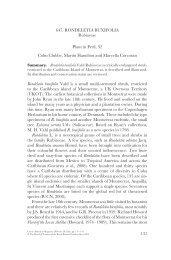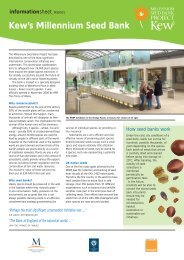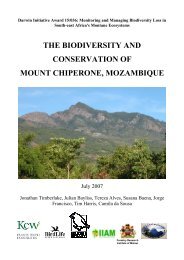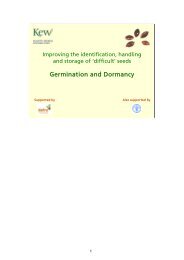Improving the identification, handling and storage of âdifficultâ seeds ...
Improving the identification, handling and storage of âdifficultâ seeds ...
Improving the identification, handling and storage of âdifficultâ seeds ...
Create successful ePaper yourself
Turn your PDF publications into a flip-book with our unique Google optimized e-Paper software.
Species that demonstrate low levels <strong>of</strong> viability during initial tests<br />
Helianthus annuus<br />
Species that demonstrate low levels <strong>of</strong> viability after a period <strong>of</strong> <strong>storage</strong><br />
Helianthus annuus<br />
Arachis hypogaea<br />
Constraints (question 5.10)<br />
Malawi is constrained in many ways for proper management <strong>of</strong> ex situ collections. Below are some<br />
<strong>of</strong> <strong>the</strong> constraints according to priorities:<br />
▪ Lack <strong>of</strong> appropriate infrastructure<br />
The <strong>of</strong>fices occupied by genebank are not suitable for genebank operations. The current building<br />
requires redoing in order to suit genebank requirements. For instance, <strong>the</strong> current building does not<br />
have a laboratory for seed testing, yet seed testing is a prerequisite to conservation <strong>of</strong> germplasm.<br />
Also in terms <strong>of</strong> vegetative materials, Malawi genebank does not have tissue culture equipment for<br />
cleaning materials that have been affected by diseases <strong>and</strong> also for slow growth<br />
▪ Backup power<br />
Malawi has a major problem with power interruption. This problem requires immediate attention by<br />
procuring a generator that will give power in times <strong>of</strong> power cuts. This is a big challenge but <strong>the</strong><br />
Nordic Genebank has promised to purchase a st<strong>and</strong>by generator.<br />
▪ Inadequate staff<br />
For Malawi Plant Genetic Resources Centre to fully function, it requires <strong>the</strong> following <strong>of</strong>ficers:<br />
curator, collection <strong>of</strong>ficer, characterization <strong>and</strong> multiplication <strong>of</strong>ficer, documentation <strong>of</strong>ficer, <strong>and</strong><br />
<strong>storage</strong> <strong>of</strong>ficer. At <strong>the</strong> moment <strong>the</strong>re are only three <strong>of</strong>ficers <strong>and</strong> one is pending retirement. This<br />
leaves a gap in terms <strong>of</strong> pr<strong>of</strong>essionalism. At technical level, <strong>the</strong> MPGRC has only two technical<br />
<strong>of</strong>ficers against five areas in <strong>the</strong> genebank. In addition to <strong>the</strong> technical <strong>of</strong>ficers, <strong>the</strong>re are three<br />
technical assistants. The current staffing level is far from <strong>the</strong> requirement <strong>of</strong> genebank for efficient<br />
performance. O<strong>the</strong>r area that is lagging behind is <strong>the</strong> documentation. This area needs highly skilled<br />
personnel to h<strong>and</strong>le different types <strong>of</strong> data generated in <strong>the</strong> genebank. Currently <strong>the</strong>re is only one<br />
<strong>of</strong>ficer who is conversant with database management.<br />
▪ Lack <strong>of</strong> technical skills in managing ex situ collections<br />
Most <strong>of</strong> staff members have <strong>the</strong>ir background in general agriculture, not in <strong>the</strong> area <strong>of</strong> genetic<br />
resources. This deters proper management <strong>of</strong> plant genetic resources. This requires continuous<br />
training <strong>of</strong> genebank <strong>of</strong>ficers in different fields. The following areas require immediate attention:<br />
tissue culture, database management, seed testing procedures, taxonomy (for species <strong>identification</strong>)<br />
<strong>and</strong> molecular biology.<br />
▪ Inadequate local support<br />
There is still an apparent lack <strong>of</strong> recognition <strong>of</strong> <strong>the</strong> conservation work at National level as evidenced<br />
from resource allocation which has resulted in heavy reliance on funding from donor projects.<br />
▪ Lack <strong>of</strong> modern computers to document materials in <strong>the</strong> genebank<br />
Documentation is very critical in management <strong>of</strong> ex situ collections as such modern computers are<br />
required for this exercise.<br />
▪ Lack <strong>of</strong> financial support to rejuvenate old samples<br />
Malawi is ecologically diverse. Samples under <strong>storage</strong> were collected from different ecological<br />
zones. This implies that samples need to be multiplied or rejuvenated in sites that have similar<br />
ecological conditions to <strong>the</strong>ir collection points. This exercise requires a lot financial resources.<br />
Possible solutions to <strong>the</strong> constraints<br />
From <strong>the</strong> problems highlighted above, an appropriate genebank <strong>of</strong>fice is <strong>the</strong> first <strong>and</strong> critical<br />
problem. Since constructing a new building is capital intensive, it is not possible to raise a new<br />
building using meagre local resources. This requires support from external donors that can support<br />
<strong>the</strong> local resources. Therefore, Malawi requests support from donors to construct a new genebank<br />
<strong>of</strong>fice so that ex situ collections are sustainably maintained.



